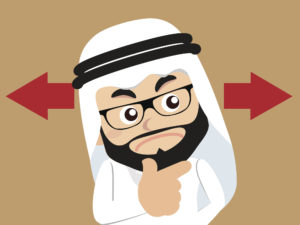
“Jihad” is a word that elicits controversy and fear, thanks to several major events in the last two decades. It’s often associated with terrorist acts, but you might be surprised to learn that it holds many different meanings even among followers of Islam. Depending on who you ask, you may find interpretations that point to a continual struggle against injustice or an internal battle within the human spirit to do what is right. These coexist alongside the headline-making fundamentalist ideologies that are not supported by many Muslims today.
One Word, Many Different Meanings
People outside of Islam tend to immediately think that jihad means “holy war.” Although that is one possible translation, it is not the only interpretation in existence. According to the Encyclopedia Britannica, the basic meaning of this Arabic word is “struggle,” “striving” or “battle.” Broadly speaking, jihad can refer to any fight waged by Muslims based on their principles or beliefs.
Because jihad is such an extensive term, it has been applied to a wide range of actions throughout history. When it has been used to denote a holy war, it has sometimes resulted in conquest. One notable example is the Islamic takeover of Persia, which is now modern-day Iran, in 651 A.D. Nowadays, Islamic extremists have employed the word in calls for retribution against their targets. As the Islamic Supreme Council of America revealed on its website, this word has been “hijacked by many political and religious groups over the ages in a bid to justify various forms of violence.”
Islamophobia Adds to Misunderstanding
The term’s bad connotation in the West can be linked to some of the public discourse and news coverage around events such as the World Trade Center attacks in 2001 and the U.S. war in Afghanistan. Additionally, negative reaction in the United States could be connected to resulting from inflammatory anti-Muslim rhetoric from politicians, conservative pundits and even celebrities. As more Muslims migrate to countries such as France, Canada and the United Kingdom, anti-Muslim sentiment grows in those nations as well. It is typically fueled by nationalism, anti-immigrant ideologies and religious bigotry, along with racism in the case of Muslims from Africa, the eastern Mediterranean region and southeast Asia.
Its Applications Within Modern Activism
Some Muslim social justice advocates have interpreted “jihad” as a fight against oppression and injustice in any form. A July 2017 Mic.com article referenced a recent speech by activist Linda Sarsour in which she referred to a quote attributed to the prophet Muhammed on the subject of jihad. When asked what the term meant, Muhammed responded, “A word of truth in front of a tyrant or leader, that is the best form of jihad.” Sarsour used the saying to inspire other Muslims to fight against fascism, white nationalism and Islamophobia. Another example of this concept in a social justice context comes from a 2016 piece in The New Yorker about the difficulties LGBTQ Muslims face. Some consider their struggles for equal rights and against anti-queer and anti-transgender prejudice as another form of jihad.
An Inner Struggle To Do What Is Right
Throughout the history of Islam, some of its theologians have spoken about “the greater jihad.” Jabir ibn Abd Allah, an 11th-century scholar, is said to have defined it as “the struggle against oneself.” While most scholars today consider the quote apocryphal in nature, it has still become an influential idea. It refers to an inner battle against oneself, usually with the goals of doing what is just, living a good life and resisting evil. For many, it has become an important ideology that’s central to being a good Muslim. Moreover, one’s interpretation of jihad can also impact how one treats other people as well as one’s fight to achieve equality, liberty and other positive social outcomes.

